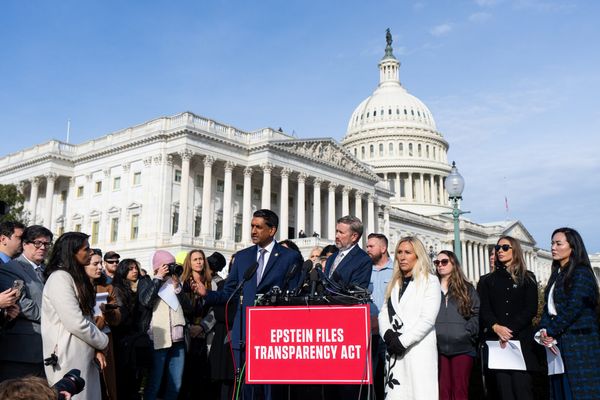
Donald Trump is expected to sign a bill to compel the justice department to release more files related to Jeffrey Epstein, the deceased child sexual abuser.
Trump had fought against releasing the Epstein files, calling the issue a “hoax” and railing against those who wanted to make the documents public, despite promising their release on the campaign trail.
But he reversed course in recent days after it was clear the House of Representatives would pass legislation, saying “we have nothing to hide” and that “it’s time to move on from this Democrat Hoax perpetrated by Radical Left Lunatics in order to deflect from the Great Success of the Republican Party, including our recent Victory on the Democrat ‘Shutdown’”.
After Trump indicated his approval of the bill, Republican holdouts swiftly moved it through the House and then the Senate. Mike Johnson had stalled the bill for months, and after the House passed it, the House speaker said he hoped the Senate would amend it, which it did not.
The justice department said earlier this year that it had released all the documents it could about Epstein without hindering investigations or revealing information about his victims.
“Much of the material is subject to court-ordered sealing,” a justice department memo from July said. “Only a fraction of this material would have been aired publicly had Epstein gone to trial, as the seal served only to protect victims and did not expose any additional third parties to allegations of illegal wrongdoing.”
It’s not clear what the department will release in response to the bill – the bill details a host of potential items that must be released, but provides exceptions for some materials.
The bill calls for the attorney general to make unclassified Epstein-related documents publicly available “in a searchable and downloadable format”, including all investigations into Epstein, his associate Ghislaine Maxwell, flight logs and travel records, individuals referenced or named in connection with his crimes, entities that were tied to his trafficking or financial networks, immunity deals and other plea agreements, internal communications about charging decisions, documentation of his detention and death, and details about any file deletions.
The department will have 30 days to turn over the documents. The bill provides for some exceptions, including redactions of victims’ identifying information or personal files, any depictions of child sexual abuse, releases that would jeopardize active investigations or prosecutions and depictions of death or abuse.
Members of Congress released tens of thousands of documents that resurfaced and added depth to relationships Epstein had with prominent figures, including Larry Summers, the former treasury secretary, and Michael Wolff, the writer and Trump biographer.
Trump and Epstein were once friends, and Trump’s name is in some of the documents released by members of Congress so far, though the mentions do not mean he was a party to any of Epstein’s criminal activity.
Documents released by Democratic members of the House oversight committee included an email from Epstein to Wolff in which Epstein said of Trump: “Of course, he knew about the girls as he asked Ghislaine to stop.” In another, he called Trump the “dog that hasn’t barked”.
Epstein emailed people about Trump regularly, usually derogatorily. “I have met some very bad people,” he wrote in one email. “None as bad as Trump. Not one decent cell in his body.”







